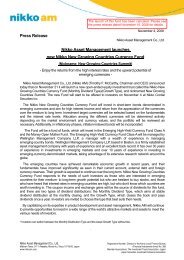The Global Currency Investor A Quarterly Analysis of 50 World ...
The Global Currency Investor A Quarterly Analysis of 50 World ...
The Global Currency Investor A Quarterly Analysis of 50 World ...
Create successful ePaper yourself
Turn your PDF publications into a flip-book with our unique Google optimized e-Paper software.
Jan 09Jul 09Jan 10Jul 10Jan 11Jul 11Dec 00Dec 02Dec 04Dec 06Dec 08Dec 10COUNTRY REPORT: EurozoneOutlook: PositiveS&P Moody's Rates Policy 3m 5y 10y[30-Sep-2011]Rating (LC) AAA Stable Aaa Stable1.<strong>50</strong>% 1.55% 1.17% 1.89%Economy and Market OutlookAs with most major economies, economic data has recently pointed to moderation after the positiveperformance after exiting the financial crisis. Business surveys have showed a broad downturn withretail sales growth slowing. Consumption may also remain muted as consumer confidence remainsunder pressure given events in the periphery <strong>of</strong> the eurozone. With EU <strong>of</strong>ficials admitting therecovery remains fragile and sovereign debt levels are rising, calls have grown for action from thecentral bank. Further tightening now looks unlikely in the months ahead but calls for an imminentinterest rate cut may be misplaced. A number have called for a cut in October, the last meetingbefore the new President - Mario Draghi from the Bank <strong>of</strong> Italy - to avoid a subsequent move beingseen as politicised. With the last increase in July the ECB is likely to concentrate on liquiditymeasures with a re-imposition <strong>of</strong> the twelve month repo and covered bond purchases alreadymooted. Economic sentiment has clearly been impacted by Greek woes but with export demandremaining resilient and the trade weighted euro at the lower end <strong>of</strong> the range <strong>of</strong> recent years, thecentral bank will be wary that an improvement in the external environment could benefit theeurozone and again raise the threat <strong>of</strong> second round inflation pressures. With the situation inGreece pivotal, the health <strong>of</strong> the banking sector and therefore liquidity measures are likely to be theprimary focus <strong>of</strong> the central bank. Ratification <strong>of</strong> the expanded Stability Mechanism is progressingand looks likely to occur by mid-October allowing continued support for Greece. Further austeritymeasures have been enacted in Greece - and other countries - and the political will to maintain thecurrent eurozone and avoid default continues.1.551.<strong>50</strong>1.451.401.351.301.251.201.15EUR/USDEUR/JPY (RHS)1404.0135130 3.01252.0120115 1.01100.0105100 -1.0CPI y/y %Unemployment Rate % (rhs)10.510.09.59.08.58.07.57.02010 2011 (f) 2012 (f)Real Growth (%) 1.8 1.7 1.1CPI (%)* 1.6 2.6 1.8Current account (% GDP) -0.5 -0.4 -0.2Fiscal balance (% GDP) -6.0 -4.3 -3.5Government Debt (% GDP) 85.1 88.7 90.5FX Reserves*End <strong>of</strong> Year213.8bnSource: Bloomberg, CitigroupPoliticsECB President: Jean-Claude TrichetNext election: n/aDespite fears spreading to other peripheraleconomies, the acceleration <strong>of</strong> a balancedbudget in Italy and measures in Greecesuch as a property tax collected via utilitybills shows the political commitment to fiscalconsolidation. This will be positive in themedium term but impacting short termgrowth in peripheral economies. Politiciansseem united in the belief that default wouldbring logistical problems, contagion andpotentially greater instability.11Confidential – not for redistribution. This material must be read in in conjunction with the “Important Information” statement provided on the last herein. page.





